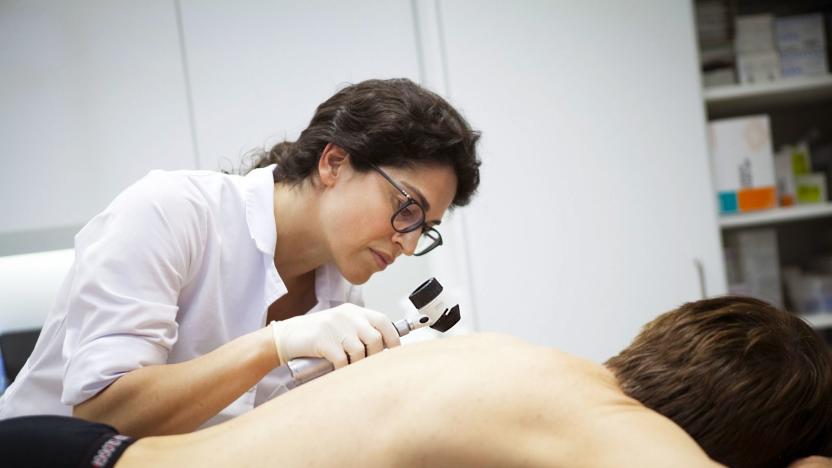melanoma
Latest

AI outperforms human doctors in spotting skin cancer
In January last year scientists reported that artificial intelligence was almost as effective at identifying skin cancer as dermatologists. Now, less than 18 months later, it's even better. In an experiment between a deep learning convolutional neural network (or CNN) and 58 dermatologists, researchers found that human dermatologists accurately identified 86.6 percent of skin cancers from a range of images, compared to 95 percent for the CNN.

Color's breast and ovarian cancer DNA test is $99 through October
During Ovarian Cancer Awareness Month (September) and Breast Cancer Awareness Month (October), genetic testing company Color is reducing the price of its new BRCA Test. The test -- which looks for mutations in the BRCA1 and BRCA2 genes that are linked to breast and ovarian cancer -- has a regular price of $149, but for this month and the next, customers can get it for $99.

Apple introduces ResearchKit apps for autism, melanoma and epilepsy
Apple wanted to make data gathering easier for medical researchers with ResearchKit. According to the company, since the launch of the open-source platform earlier this year, over 100,000 participants have already shared their health data with a host of apps that study asthma, diabetes, breast cancer and more. The Kit's ever-increasing list of studies will now include autism, epilepsy and melanoma.

This smartphone app can detect skin cancer
You can already use your smartphone to do things like hail a pimp ride home or order an artisan pizza, obviously the next step is cancer detection, right? Researchers at the University of Houston think they've created a smartphone app that can detect melanoma even better than your doctor. Called DermoScan, the app works by taking a photo of your odd-shaped mole, and then analyzing it to determine if it might be cancerous. Initial testing found that DermoScan was able to identify skin cancer roughly 85 percent of the time, making it just as effective as visiting a dermatologist and even better at diagnosing melanoma than the average primary care physician. Don't head over to the app store just yet. The app requires a special $500 magnifying glass to make the magic happen -- not exactly more cost effective than a trip to the old MD.

Ultra-thin handheld microscope could sniff out skin cancer, forged documents
It may not look like it, but that sleek black thing pictured above is actually a microscope. Designed by engineers at Germany's Fraunhofer Institute for Applied Optics and Precision Engineering IOF, this little guy boasts a 5.3mm optical length, rendering it slim enough to fit in the palm of your hand, yet powerful enough to deliver images at a scanner-like resolution of five micrometers, over a wide surface area. Fraunhofer's researchers achieved this balance by essentially tossing out the manual on traditional microscope design. Whereas most devices slowly scan areas and construct images on a piecemeal basis, this handheld uses several small imaging channels and a collection of tiny lenses to record equal sized fragments of a given surface. Unlike conventional scanner microscopes, all of these 300 x 300 square micrometer imaging channels are captured at the same time. With a single swipe, then, users can record 36 x 24 square mm shots of matchbox-sized objects, without even worrying about blurring the images with their shaky hands. The prototype is still two years away from going into production, but once it does, engineers say it could help doctors scan patients for skin cancer more easily, while also allowing bureaucrats to quickly confirm the authenticity of official documents. We can only imagine what it could do for Pac-Man. Full PR after the break.

Cellphones are dangerous/not dangerous, eyezapoppin! edition
While you're totally in your rights to keep frettin' over brain tumors, it looks like your eyes are safe from the cellphone cancer -- at least until another study is released. According to a paper published in the Journal of the National Cancer Institute, a German study involving roughly 1,600 people has found no conclusive link between cellphone use and uveal melanoma. This contradicts an earlier, smaller study by the same researchers that suggested that there indeed might be a connection. Is that clear? It doesn't seem that a consensus will be reached on this subject any time soon, but for the morbidly curious we have years of cellphone / cancer hodgepodge for your perusal.

Researchers aim to detect skin cancer via scent
Here's an interesting one. A group of US experts have discovered that a common form of skin cancer could one day be detected very early on by simply analyzing scents. More specifically, it was found that basal cell carcinomas give off an odor that is distinctly different than samples from healthy skin, which obviously opens up the possibility for "cheap and painless testing." In the future, researchers are hoping to create scent profiles for other types of skin cancer, including the infamous malignant melanoma. Believe it or not, a machine may be only one of the devices used to eventually sniff cancerous cells -- similar research is ongoing using canines and their remarkably sensitives schnozes.





